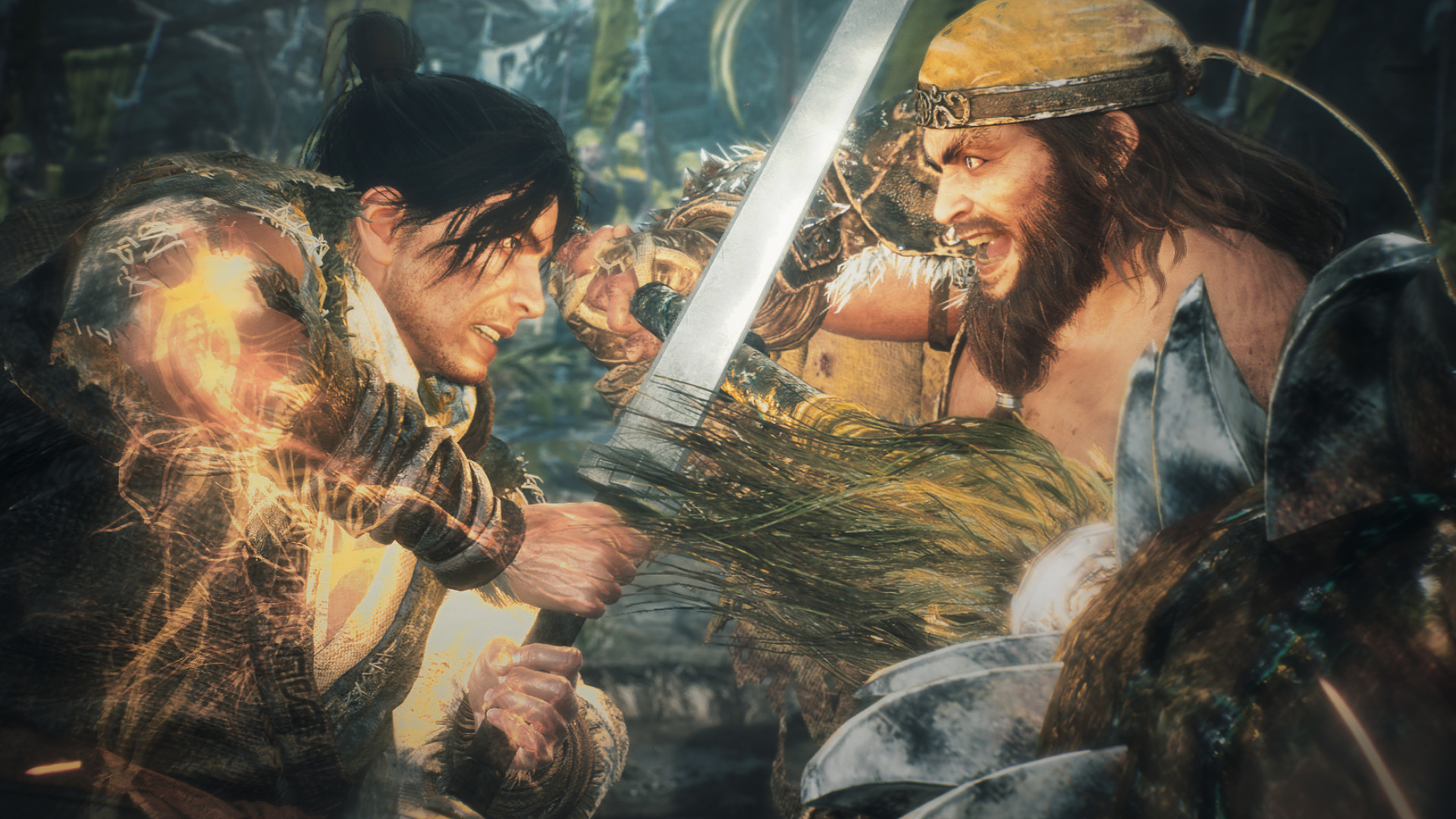Our Verdict
Technical issues aside, Wo Long is a master of its craft that future soulslikes should study under.
PC Gamer's got your back
What is it? A Souls-adjacent action RPG.
Release date March 3, 2023
Expect to pay $60/£50
Developer Team Ninja
Publisher KOEI Tecmo
Reviewed on GeForce GTX 970, Intel i7-4790K, 16GB RAM
Steam Deck TBA
Link Official site
Wo Long, meaning "Hidden Dragon", is an appropriate name for a game that feels like it's basically come from nowhere to tear up the action RPG landscape. Which isn't to say it doesn't adhere to some of that framework—the legacy of Nioh and Dark Souls is still present—but by removing the traditional constraints of the subgenre, Wo Long takes soaring flight.
It's a project born from Team Ninja's partnership with KOEI, a publisher which is well known for its games based around the Three Kingdoms era of Chinese history—most notably Dynasty Warriors. Wo Long is set in that same era, blending historical fiction with the finely honed combat Team Ninja is known for, along with a dash of the fantastical and demonic. You are an unnamed warrior; a nobody who gets tangled up in monumental events. As if to drive home your nobody status, the very first boss might be the toughest in the entire game. You encounter this giant of a man before you have any major skills, spells or special weapons to call upon. He's only the first boss but still he has two tough-as-nails phases. Beating him is the price of admission, a test to prove that you're ready to stand beside the heroes of Chinese legend. “You must be this good to enter,” Wo Long seems to say.
Die nasty warriors
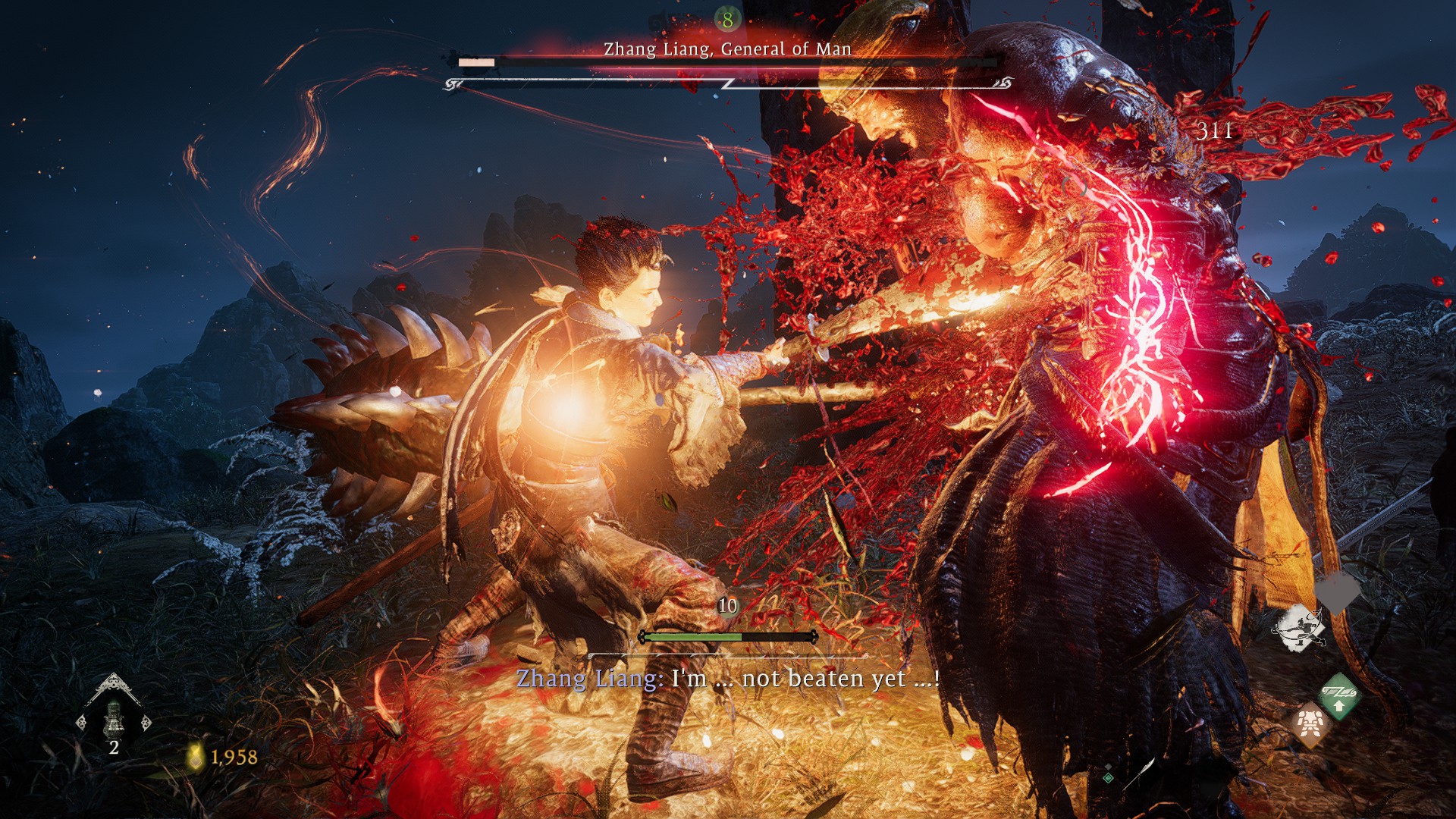
Being a nobody doesn't mean feeling like one. Right from the get-go fights are a dizzying dance of spins, leaps and kicks that echoes the Wuxia cinematic tradition the game draws upon. Wo Long's combat is a big change of pace from other soulslikes and even Team Ninja's own Nioh 2. Where they emphasise searching for openings to land deadly strikes and making sure your own defences don't falter, Wo Long has a flow to it that is less back and forth and more constantly in motion.
This is down to the lack of a soulslike staple: stamina, which has been replaced by your spirit gauge. You're free to attack, block and dodge as much as you want when the gauge is positive, but you've got to time your moves right. Playing too defensively, spamming your most powerful attacks or getting blocked by your opponent reduces your spirit, which will leave you stunned when it's fully negative. Landing hits and pulling off successful deflects or parries, meanwhile, lets you regain spirit. The beauty of this is that, when you know what you're doing, nothing can hold you back. By creating openings with a gentle parry, dodging around attacks, and then laying into an enemy, you can get through fights without ever losing momentum, racking up kill after kill.
Even the toughest of bosses can die as easily as you can, provided you can keep pace with them. You can spend an hour learning and dying to a boss only for your successful attempt to last 60 seconds. Because it's all go, all the time, the moment a fight clicks with you it feels like perfecting a choreographed scene. Because the game telegraphs attacks so clearly despite the ferocious speed of battles, I was able to follow the action and land my parries in a way that genre peers like Sekiro really had me struggling to do.
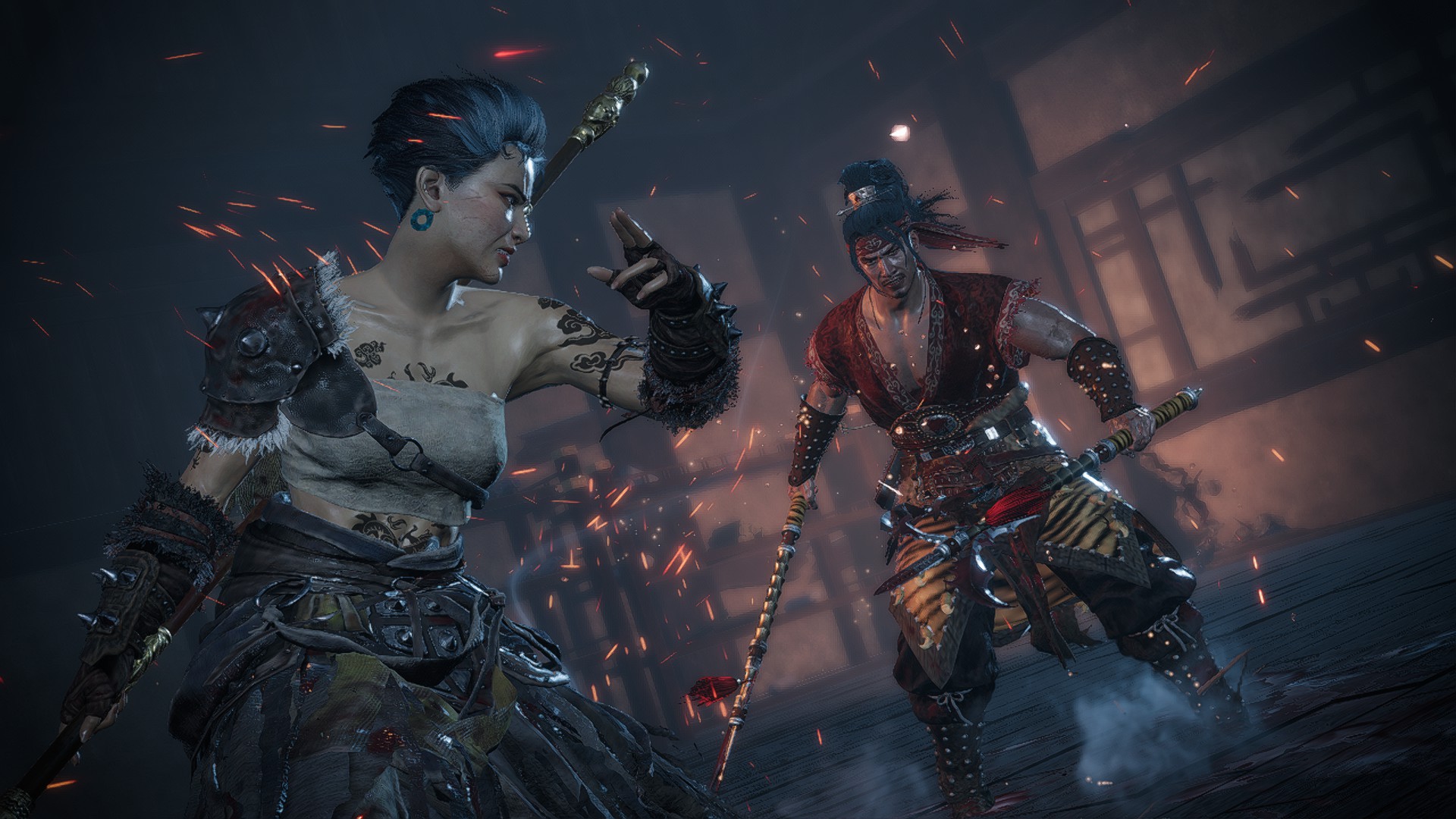
As if that wasn’t enough of an arsenal, you have spells and the ability to summon spirits to aid you. Spells are all tied to each of the game’s five stats (each representing one of the five phases of Wuxing philosophy) and embody related elements (fire, water, etc) but you’re not a wizard. Spells aren’t something you build around, you use them to compliment your moves by adding lightning to a blade or planting a circle that slows enemies. The spirit summons are a special ability you can call upon after filling a meter that lets you bring in a powerful entity to back you up with serious buffs. These summons are an ace up your sleeve to claw back a victory from the jaws of defeat. Stuff like this meant I never felt hopeless in Wo Long. It might honestly be the peak of the action RPG arc. The time between encountering a seemingly unbeatable foe to absolutely kicking their ass is the shortest loop of its kind I've played. Exhilarating feels inadequate as a description.
+5 Flying Daggers
The time between encountering a seemingly unbeatable foe to absolutely kicking their ass is the shortest loop of its kind I've played. Exhilarating feels inadequate as a description.
If it falters in its design, it's in Team Ninja's commitment to doling out heaps of randomly generated loot. I found it impossible to not long for Elden Ring's more bespoke item placement while organising my inventory to clear out two dozen Han Officer Trousers. You'll still find special weapons with their own movesets and martial arts special attacks, offering you plenty of unique options, but there's a lot of minutia to pore over, which can become tedious when you're comparing +10 Health with 4.8% Defence.
Mastering combat is only part of the battle—you'll also need to become an avid explorer. Just don't go in expecting the vastness of Elden Ring. Wo Long has no open world, instead breaking itself up with a central hub (where you'll apply upgrades and get some side quests) and distinct missions; though there's certainly still a whole lot of game here. It isn't as cool to pick a level off a selection screen as it would be to roam from place to place, but it does mean you can experience a greater number of distinctive areas back-to-back. You'll be cutting your way across rickety rope bridges spanning deep chasms in one mission, and then find yourself on a snowy battlefield taking on a castle under siege in the next. There are labyrinths made out of shipwrecks and haunted bamboo forests. It's never as wildly fantastical as Dark Souls or Elden Ring, but its grim battlefields are pleasingly intricate, full of shortcuts and secrets.
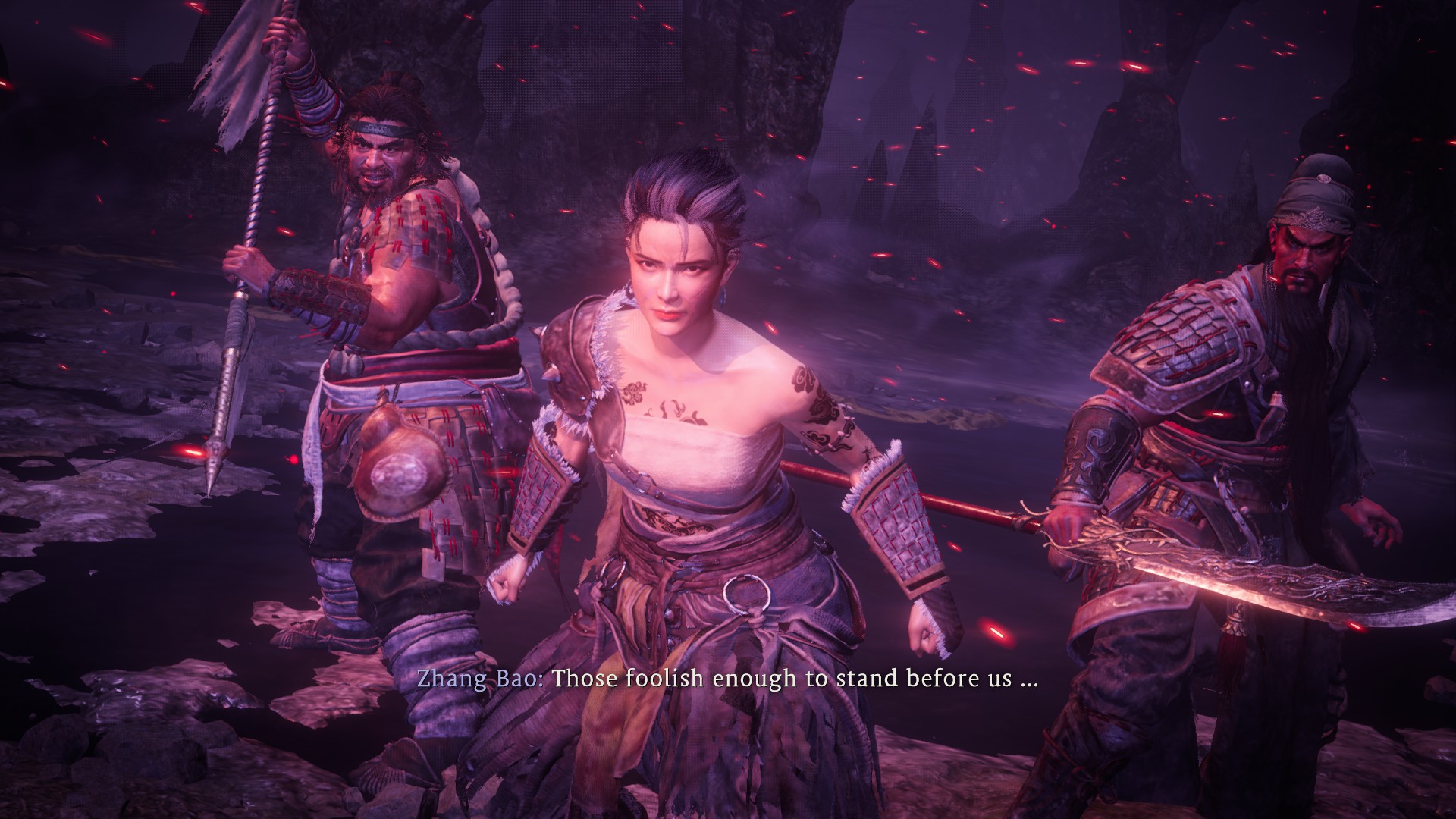
Exploration is about more than taking in the sights, though, as every area is littered with not only battle flags that act as your checkpoints but also banners. Raising these increases your morale, buffing your stats and bringing the difficulty down. Your enemies all have a morale level, too, represented by a number that's visible the moment you bump into them. You can take them on there and then, or explore and give yourself a helping hand. You can even bring down enemy morale by taking out leaders or wizards.
Wo Long separates itself in this theming, emphasising that everyone is part of a larger fight. As well as fully fledged co-op for up to three players (handled through a menu for those who may dislike FromSoftware's more esoteric approach) and competitive invasions, you'll also amass a roster of NPC allies to be called upon when needed. You'll even level them up and get extra benefits from growing your bond with them.
Dudes rock
These comrades feel like companions in a way FromSoftware's NPC summons never quite managed, as they stand by you each step of the way and share their story. Several missions make them mandatory, and I couldn't help but get attached. Zhao Yun, one of the first heroes to offer their assistance, was my main guy, my best bud. If you know the Three Kingdoms history and especially Romance of the Three Kingdoms, be it through Dynasty Warriors or a myriad of other adaptations, their inclusion feels more meaningful. It's fun to see historical characters pop up like a cameo in an Avenger's film—albeit with more important roles to play.
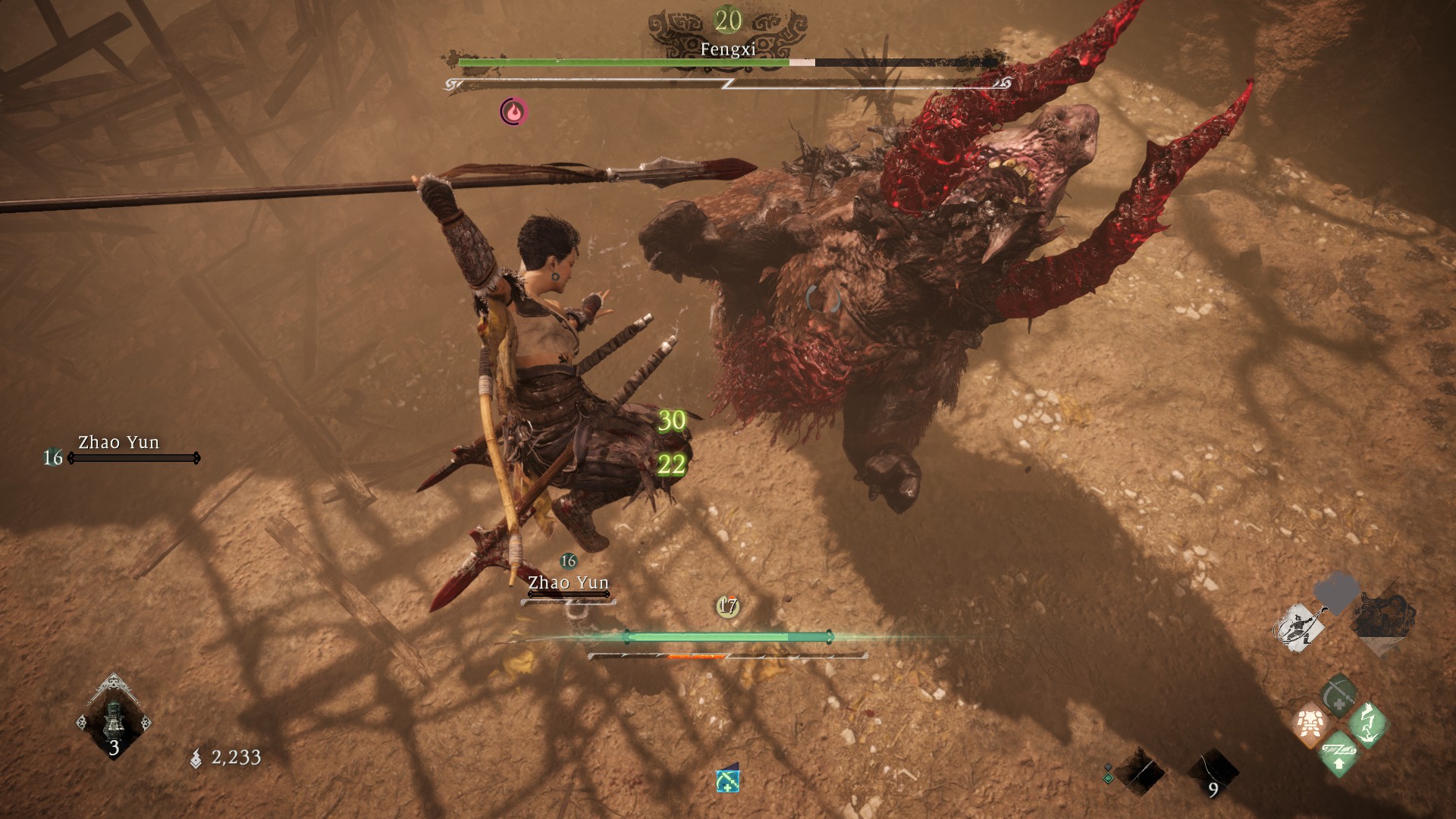
Despite the nods to history, Wo Long goes hard with the dark fantasy, shaking things up with demons diverting the natural course of history. Its monsters are closer to body horror abominations than they are creatures of myth (fitting given the game's producer, Masaaki Yamagiwa, worked on Bloodborne) and the sound of buzzing locusts feeding on the corpses of a battlefield genuinely disturbs. Wo Long sometimes feels like a mash-up of genres, with romantic heroes caught up in a horror story. Both sides are balanced well, though, and while Wo Long never manages to conjure up a mythology or world as captivating as FromSoft's finest, its mix of history, horror and fantasy is compelling.
A shame then that Wo Long is undermined by some technical issues on PC. Frame rates generally held at 60 fps—there's no unlocked fps option—but in spots there were some dire dips that risked bringing the game to a halt. In addition, there were a few visual bugs like a strange glow that would take over the screen until I reloaded. I also encountered a couple of crashes—not something you really want where every inch of progress is hard won. Tinkering with the settings can boost performance, but there's not much that can be done about the glitches without a patch.
Apart from these technical blemishes, Wo Long is an exceptionally accomplished evolution. It doesn't have the same variety as something like Elden Ring, but its focus on Wuxia-style martial arts puts it a cut above its peers. It's a game where challenges feel exciting rather than punishing because the learning curve is so exquisite and mastery feels sublime. Team Ninja has really managed to push the envelope, and lovers of Wuxia cinema and action RPGs had best not miss this one.
Technical issues aside, Wo Long is a master of its craft that future soulslikes should study under.
